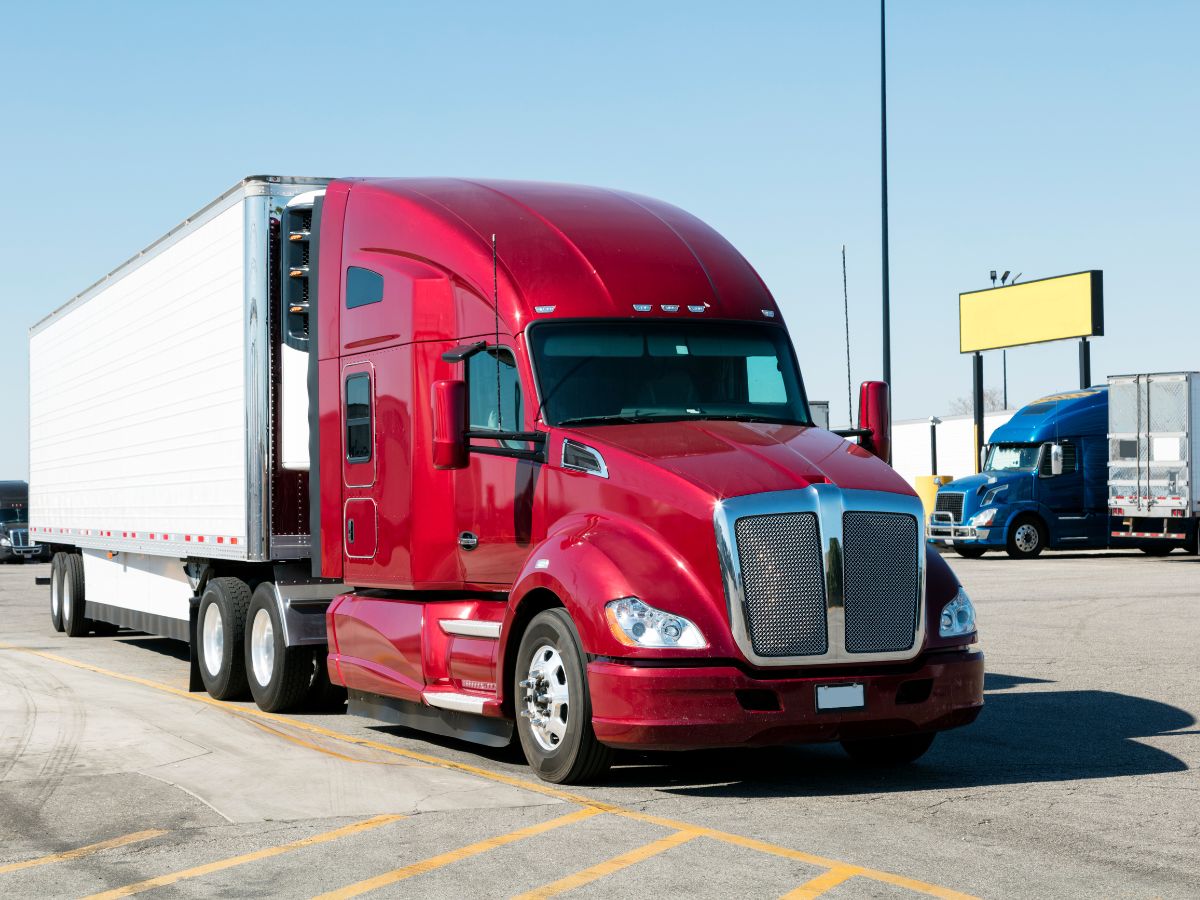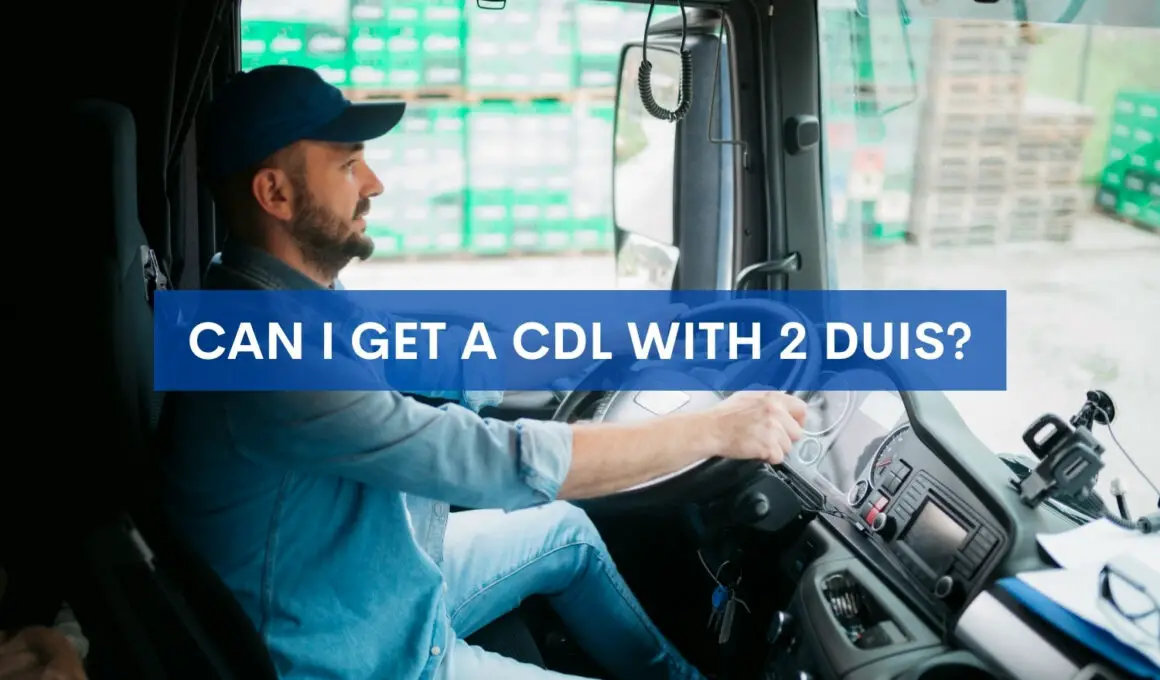In This Article Show
While I’ve spent a good part of my life tinkering with engines and troubleshooting automotive problems, I’ve also developed a knack for writing. Sharing insights and knowledge about the world of vehicles has become a parallel passion for me.
Now, diving straight to the point: let’s talk about Commercial Driver’s Licenses (CDLs). It’s not just about knowing how to drive; it’s about being eligible, responsible, and trustworthy enough to handle large vehicles.
A question I often get is, “Can I get a CDL if I have 2 DUIs?” To be honest, it’s not as straightforward as a yes or no. But, fret not, because today, we’re unpacking this complicated matter in a way that even those unfamiliar with the intricacies of vehicle regulations can understand. Let’s dive in.
Understanding CDL Regulations
As we cruise deeper into the topic, let’s first get familiar with what a CDL really stands for. For those who might not know, a Commercial Driver’s License (CDL) is not your regular driving license.
A special permit allows you to operate large, commercial vehicles. Think big rigs, school buses, and those massive trucks you often see dominating the highways.
I’ve worked on many of these giants as a mechanic. And I can tell you, driving them is a different beast altogether. Hence, the process to earn a CDL is more rigorous than that of a regular driving license.
General Requirements
Age
To apply for a CDL, you must be at least 18 years old for intrastate (within the same state) driving, and 21 for interstate (across different states) or hazardous material transportation.
Proof of Residency and Identification
This might sound like a no-brainer, but you’d be surprised. Always ensure your documents are up-to-date.
Medical Examination
Driving a commercial vehicle isn’t just about skills; it’s about ensuring you’re medically fit to handle the task. A DOT medical certificate is often required.
Driving Skills Test
Beyond the written tests, you’ll be required to prove your competence behind the wheel of a mammoth machine.
It’s worth noting that CDL classifications also exist based on the type of vehicle and what it’s used for. Class A, B, and C licenses have its own set of standards and criteria.
I’ve met many aspiring commercial drivers, eager to hit the road. But regulations are in place for a reason. Remember, with great power (or in this case, a powerful vehicle) comes great responsibility.
And while this might sound like a line from a superhero movie, it’s pretty spot on when you’re controlling a 26,000-pound machine.

The Impact of DUIs on CDL
In my years working with vehicles, from compact cars to behemoth trucks, I’ve often noticed that the topic of DUIs evokes strong reactions, and rightfully so.
Driving Under the Influence (DUI) isn’t just a mere traffic violation; it’s a critical safety concern. Especially when we talk about commercial vehicles, the stakes are even higher.
What’s a DUI?
To break it down for those who might be unfamiliar, a DUI means operating a vehicle after consuming alcohol or drugs beyond the legally permissible limits. While the specifics can vary from state to state, one fact remains constant: it’s a significant road safety hazard.
First DUI vs. Multiple DUIs: Does it Make a Difference?
Absolutely. If you’ve been pulled over and charged with a DUI once, it’s a grave matter, especially concerning a CDL. The consequences can range from a temporary disqualification of your CDL to more severe penalties, depending on the circumstances.
However, if you find yourself with not one but two DUIs, the road to retaining or obtaining your CDL becomes steeper. The regulations are stricter, and the penalties often more severe.
How DUIs Limit or Prohibit Obtaining a CDL
From my encounters with commercial drivers and fellow mechanics, I’ve garnered that licensing agencies often view a DUI as a red flag. Here’s why:
Safety Concerns
The main objective of CDL regulations is ensuring road safety. A DUI indicates a lapse in judgment and raises concerns about an individual’s ability to handle commercial vehicles responsibly.
Trustworthiness
Holding a CDL is not just about skill; it’s about trust. Those with multiple DUIs might be seen as repeated risk-takers, making agencies hesitant to grant them the responsibility of a CDL.
Higher Insurance Premiums
Insurance companies often view DUIs as high-risk behavior. This can result in elevated insurance premiums for drivers, making it less economically feasible for them or their employers.
I can’t stress the importance of responsible driving enough. Commercial vehicles’ sheer size and power mean any mishap can have devastating consequences. So, while the regulations might seem stringent, they’re there for the safety of not just the CDL holder but everyone else on the road.
The Federal Motor Carrier Safety Administration (FMCSA) Rules
Navigating through the world of automotive mechanics for over 13 years has given me not just a closer look at engines, but also an understanding of the regulatory bodies that oversee the vast highway networks.
One such crucial organization, especially when discussing CDLs and DUIs, is the Federal Motor Carrier Safety Administration, or FMCSA for short.
Role of the FMCSA
For the uninitiated, the FMCSA is a federal agency that governs the trucking industry in the United States. Its primary objective? To enhance highway safety through regulations and oversight.

FMCSA and DUIs
The FMCSA is unequivocal in its stand against DUIs for commercial drivers, and here’s how they regulate it:
Lower BAC Limit
Unlike regular drivers who usually face penalties at a Blood Alcohol Concentration (BAC) of 0.08%, commercial drivers have a stricter limit set at 0.04%. This essentially means that even a small amount of alcohol can lead to serious consequences for a CDL holder.
Immediate Out-of-Service Orders
If a commercial driver is caught with a BAC of 0.04% or more, they face an immediate 24-hour out-of-service order, sidelining them right on the spot.
First Offense Penalties
A first-time DUI offender holding a CDL can face a license disqualification for up to one year. If they were transporting hazardous materials at the time, this can escalate to a whopping three years.
Multiple Offenses
A second DUI offense can lead to a lifetime disqualification of a CDL. While there might be possibilities for reinstatement after a decade, it’s a steep hill to climb.
The Goal of the FMCSA
Through these strict rules, the FMCSA aims to ensure that our roads remain safe from potential hazards. In my long stint as a mechanic, I’ve seen the aftermath of road accidents involving commercial vehicles.
Believe me when I say, it’s not a pretty sight. By ensuring that commercial drivers adhere to stringent safety standards, the FMCSA works to minimize such tragic occurrences.
As we continue exploring the relationship between CDLs and DUIs, it’s essential to recognize that while federal regulations set the baseline, individual states might have their own rules. But more on that later.
For now, always remember, when behind the wheel of a commercial vehicle, safety should always be in the driver’s seat.
State-Specific Guidelines
I’ve consistently noted that laws and rules can vary considerably depending on where you are. Just as every vehicle model has unique quirks, each state has its specific set of guidelines for CDLs and DUIs.
The Role of Individual States
The FMCSA sets the foundational rules, but states can impose additional restrictions or guidelines based on their local considerations. Think of federal regulations as the basic structure, and state rules as the customizations added to suit local needs.
Examples of Diverse State Rules
California
In the Golden State, any DUI conviction, even in a personal vehicle, can lead to the suspension of a CDL for one year. A second offense? That could result in a lifetime disqualification.
Texas
The Lone Star state takes DUI offenses seriously. Beyond the federal guidelines, Texas imposes heavy fines and potential jail time for commercial drivers caught under the influence.
Florida
The Sunshine State looks at alcohol-based DUIs and includes offenses related to controlled substances. A CDL holder found guilty of a DUI, whether from alcohol or drugs, faces severe penalties.
Reinstating a CDL After a DUI
Several states offer pathways for CDL holders to reinstate their licenses after serving their disqualification period. This often involves:
- Completing a state-approved DUI program or course.
- Undergoing and passing rigorous driving and knowledge tests.
- Paying a hefty reinstatement fee.
The Takeaway
From my vantage as a seasoned mechanic, I’ve often felt that while machines can be fixed and tuned, the human element can be unpredictable. The patchwork of state-specific regulations emphasizes the collective commitment to ensuring that our roads remain as safe as possible.
So, suppose you’re an aspiring commercial driver or a CDL holder. In that case, it’s crucial to familiarize yourself not just with the federal regulations, but also with the rules of your specific state.
It’s not just about being compliant; it’s about ensuring that every journey ends safely. And always remember, while I might be here to fix your vehicle’s problems, some mistakes on the road can have irrevocable consequences.

Repercussions of Driving a Commercial Vehicle with a DUI
The implications of getting behind the wheel after consuming alcohol or drugs are severe, regardless of the type of vehicle. However, when it comes to operating a commercial vehicle, the repercussions of a DUI are magnified due to the potential for large-scale damage and harm.
1. Immediate Loss of Livelihood
For many, driving commercial vehicles isn’t just a job; it’s their livelihood. A DUI can lead to an immediate suspension or revocation of a CDL, rendering a driver unable to work and earn for an extended period.
2. Legal Consequences
Apart from CDL disqualification, individuals caught driving a commercial vehicle under the influence can face criminal charges, heavy fines, and even jail time, depending on the severity of the offense and local laws.
3. Hefty Fines and Financial Strain
Beyond the initial legal penalties, DUI convictions often come with steep fines. Additionally, there’s the potential for increased insurance premiums, making getting back on the road more costly even after serving a suspension.
4. Damaged Reputation
In the world of commercial driving, reputation matters. A DUI can tarnish a driver’s image, challenging finding future employment within the industry. Companies prioritize safety and responsibility, and a DUI is a significant red flag for potential employers.
5. Risk to Public Safety
The primary concern with DUIs is public safety. Commercial vehicles are large, heavy, and require skilled handling. Impaired judgment or slowed reaction time can result in catastrophic accidents, posing immense risks to other road users.
6. Liability Issues
If a commercial driver under the influence causes an accident, they can be held liable for damages. This could mean facing civil lawsuits and being responsible for medical bills, property damage, or compensation for pain and suffering.
7. Loss of Personal Driving Privileges
While the focus here is on commercial driving, it’s essential to remember that a DUI while operating a commercial vehicle can also impact one’s personal driving privileges. This can result in the suspension of a personal driving license, adding further inconvenience to daily life.
Wrapping it up
In conclusion, while the allure of the open road and the hum of a powerful engine can be enticing, the responsibilities that come with driving a commercial vehicle are immense.
Apart from its legal ramifications, a DUI jeopardizes public safety, one’s career, and personal life. It’s a stark reminder of always making safe and informed choices.











